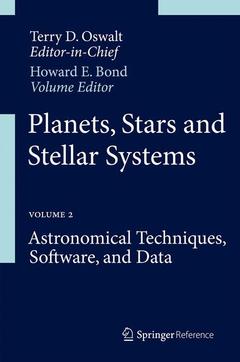Planets, Stars and Stellar Systems, 2013 Volume 2: Astronomical Techniques, Software, and Data
Coordonnateur : Bond Howard E.
Rédacteur en Chef : Oswalt Terry D.

This is volume 2 of Planets, Stars and Stellar Systems, a six-volume compendium of modern astronomical research, covering subjects of key interest to the main fields of contemporary astronomy. This volume on ?Astronomical Techniques, Software, and Data? edited by Howard E. Bond presents accessible review chapters on Astronomical Photometry, Astronomical Spectroscopy, Infrared Astronomy Fundamentals, Astronomical Polarimetry: Polarized Views of Stars and Planets, Sky Surveys,Techniques of Radio Astronomy,Radio and Optical Interferometry: Basic Observing Techniques and Data Analysis, Absolute Calibration of Spectrophotometric Standard Stars,Virtual Observatories, Data Mining, and Astroinformatics, Statistical Methods for Astronomy, Numerical Techniques in Astrophysics .
All chapters of the handbook were written by practicing professionals. They include sufficient background material and references to the current literature to allow readers to learn enough about a specialty within astronomy, astrophysics and cosmology to get started on their own practical research projects. In the spirit of the series Stars and Stellar Systems published by Chicago University Press in the 1960s and 1970s, each chapter of Planets, Stars and Stellar Systems can stand on its own as a fundamental review of its respective sub-discipline, and each volume can be used as a textbook or recommended reference work for advanced undergraduate or postgraduate courses. Advanced students and professional astronomers in their roles as both lecturers and researchers will welcome Planets, Stars and Stellar Systems as a comprehensive and pedagogical reference work on astronomy, astrophysics and cosmology.
1. Astronomical Photometry. 2. Astronomical Spectroscopy. 3. Infrared Astronomy Fundamentals. 4. Astronomical Polarimetry: Polarized Views of Stars and Planets. 5. Sky Surveys. 6. Techniques of Radio Astronomy 7. Radio and Optical Interferometry: Basic Observing Techniques and Data Analysis. 8. Absolute Calibration of Spectrophotometric Standard Stars. 9. Virtual Observatories, Data Mining, and Astroinformatics. 10. Statistical Methods for Astronomy. 11. Numerical Techniques in Astrophysics.
Dr. Terry D. Oswalt, an astronomer, is Head of the Department of Physics and Space Sciences and Associate Provost for Research at Florida Institute of Technology. He has also served the U.S. National Science Foundation as program officer for Stellar Astronomy and Astrophysics. He earned his Ph.D. in Astronomy at The Ohio State University specializing in photoelectric and spectroscopic studies of binary star systems, late stages of stellar evolution, minor planets, and comets.
Since coming to Florida Tech in 1982, Dr. Oswalt has taught astronomy and physics, while continuing his primary research interest in studies of collapsed stars called white dwarfs. Because such objects are very faint, this work often takes him to Kitt Peak National Observatory in Arizona, Cerro Tololo Inter-American Observatory in Chile, and Mauna Kea Observatory in Hawaii, where telescopes as large as 10-meters are available on a competitive basis to scientists.
Oswalt is the founding Chairman of the Southeast Association for Research in Astronomy, a consortium of 10 universities which operates an automated 1-meter telescope at Kitt Peak National Observatory near Tucson, Arizona. In 2007 SARA will assume operations of a similar telescope at Cerro Tololo Interamerican Observatory in Chile. Oswalt also has been director of the SARA summer internship program, which brings undergraduate students from around the U.S. to the SARA facility at Kitt Peak each summer to do research in astronomy. Dr. Oswalt has written over 100 scientific articles and edits the I.A.P.P.P. Communications, an international journal for advanced amateurs, students, teachers and professionals who collaborate on research and educational projects in astronomy. He is also the editor for a three-volume set of Springer books, "The Future of Small Telescopes in the New Millennium".
Dr. Bond received his PhD in astronomy from the University of Michigan in 1969.
From 1970 to 1984 he was a faculty member
Presents comprehensive coverage of state-of-the-art 21st century astronomical techniques, software and data
Provides the essential background and directs readers to other seminal literature on the topics it covers
Well-suited for lecturers and students as material for advanced courses in astronomy
Volume 2 of a six-volume compendium of modern astronomical research covering subjects of key interest to the main fields of contemporary astronomy and astrophysical cosmology
Date de parution : 03-2013
Disponible chez l'éditeur (délai d'approvisionnement : 15 jours).
Prix indicatif 843,99 €
Ajouter au panierDate de parution : 02-2013
Ouvrage de 508 p.
15.5x23.5 cm
Thèmes de Planets, Stars and Stellar Systems :
Mots-clés :
Astroinformatics; Astronomical interferometry; Astronomical photometry; Astronomical polarimetry; Astronomical spectroscopy; Astronomy reference work; Infrared astronomy fundamentals; Infrared data analysis; Infrared observation techniques; Infrared surveys; Numerical techniques in astrophysics; Radio astronomy; techniques; Statistical methods in astronomy
